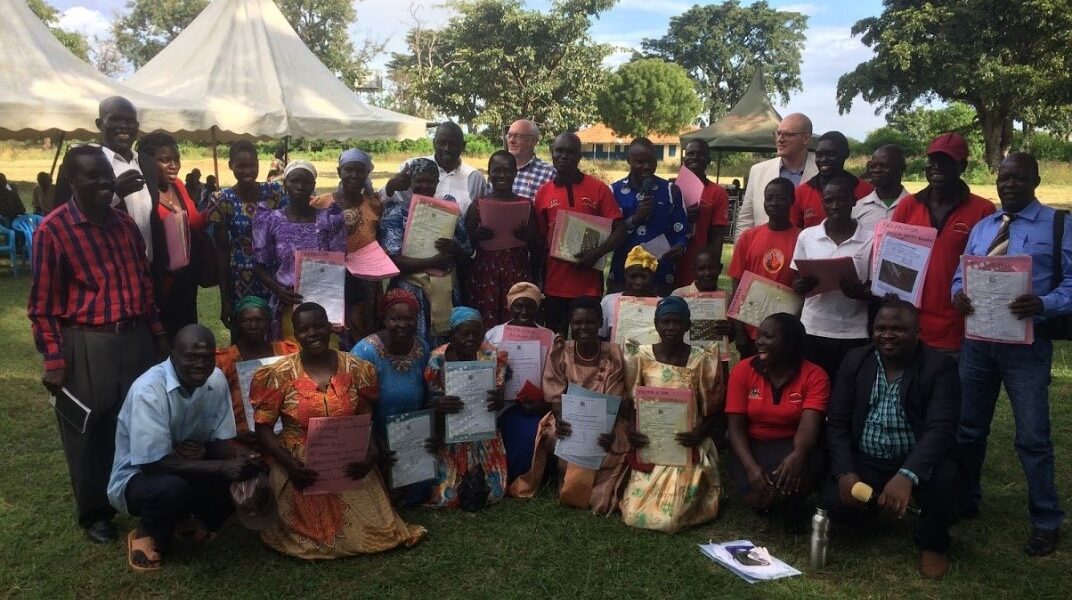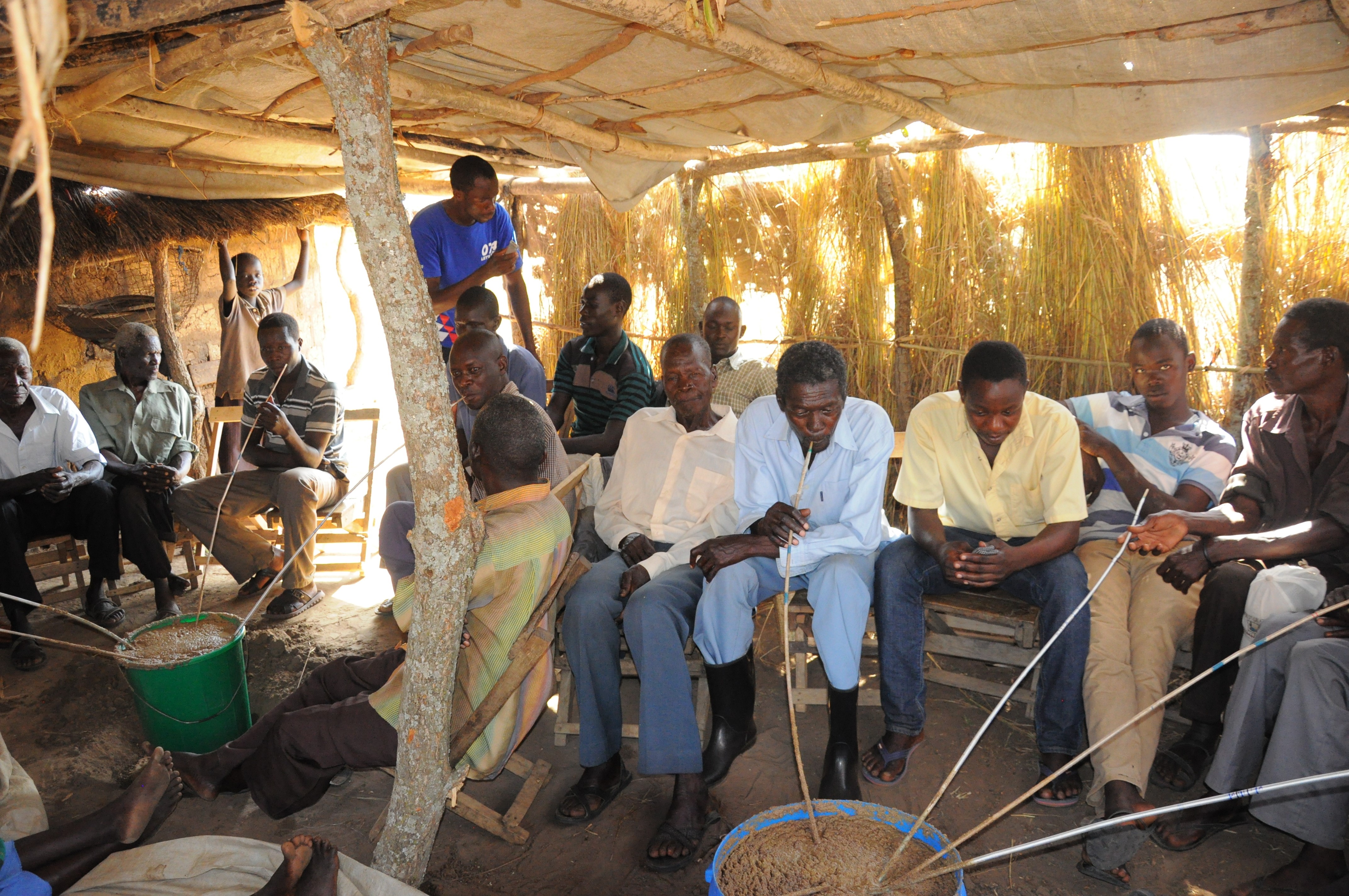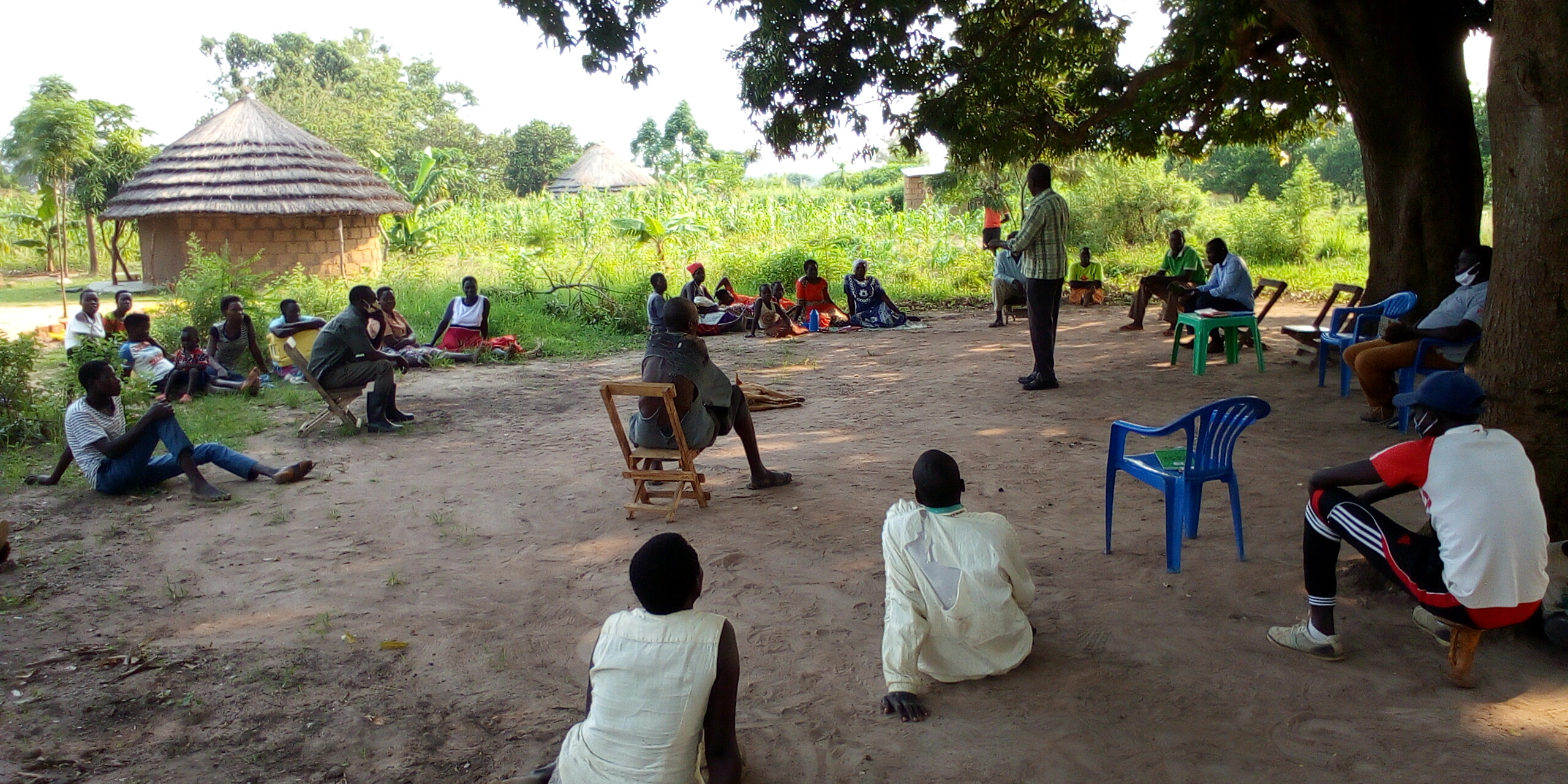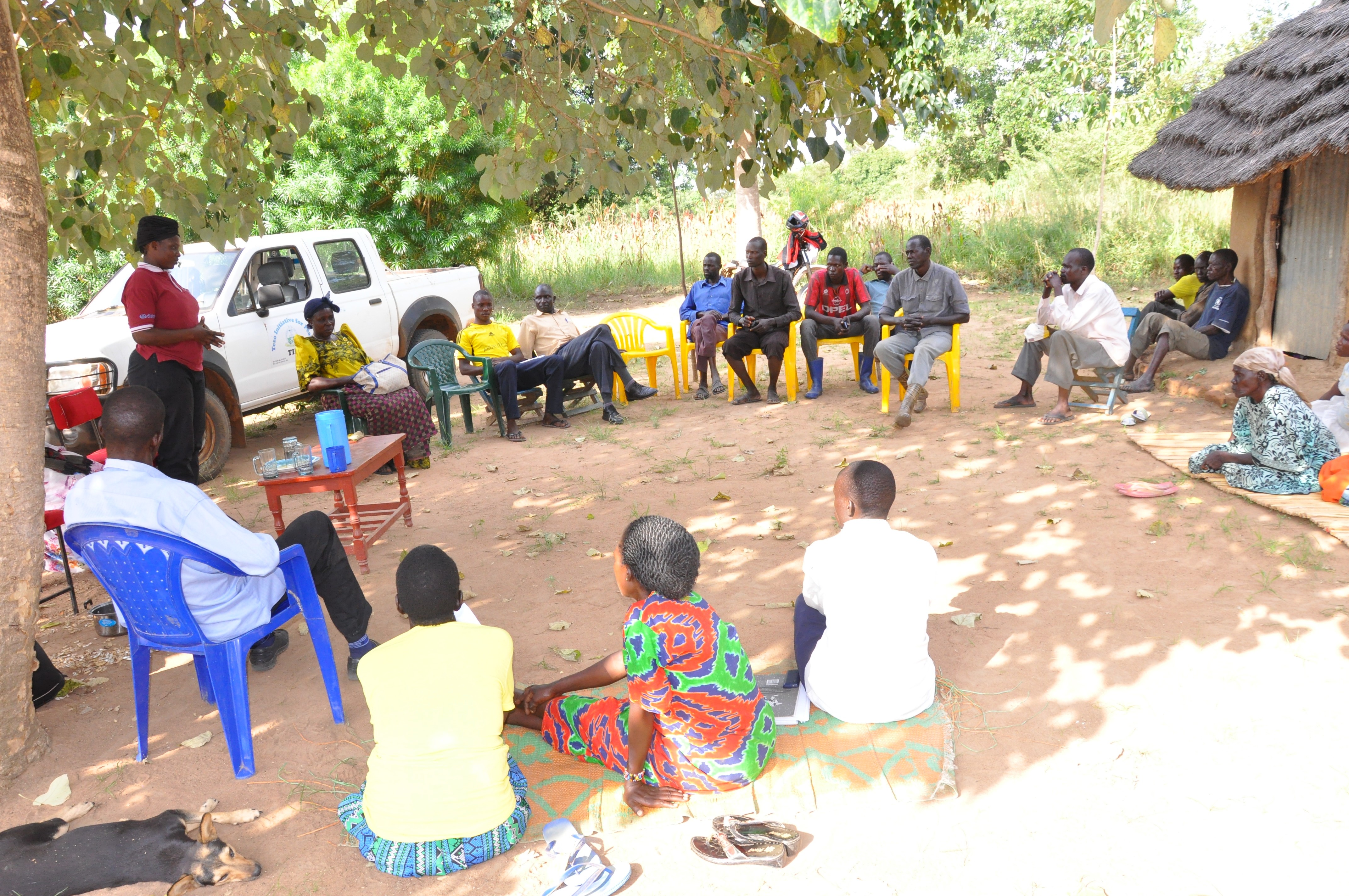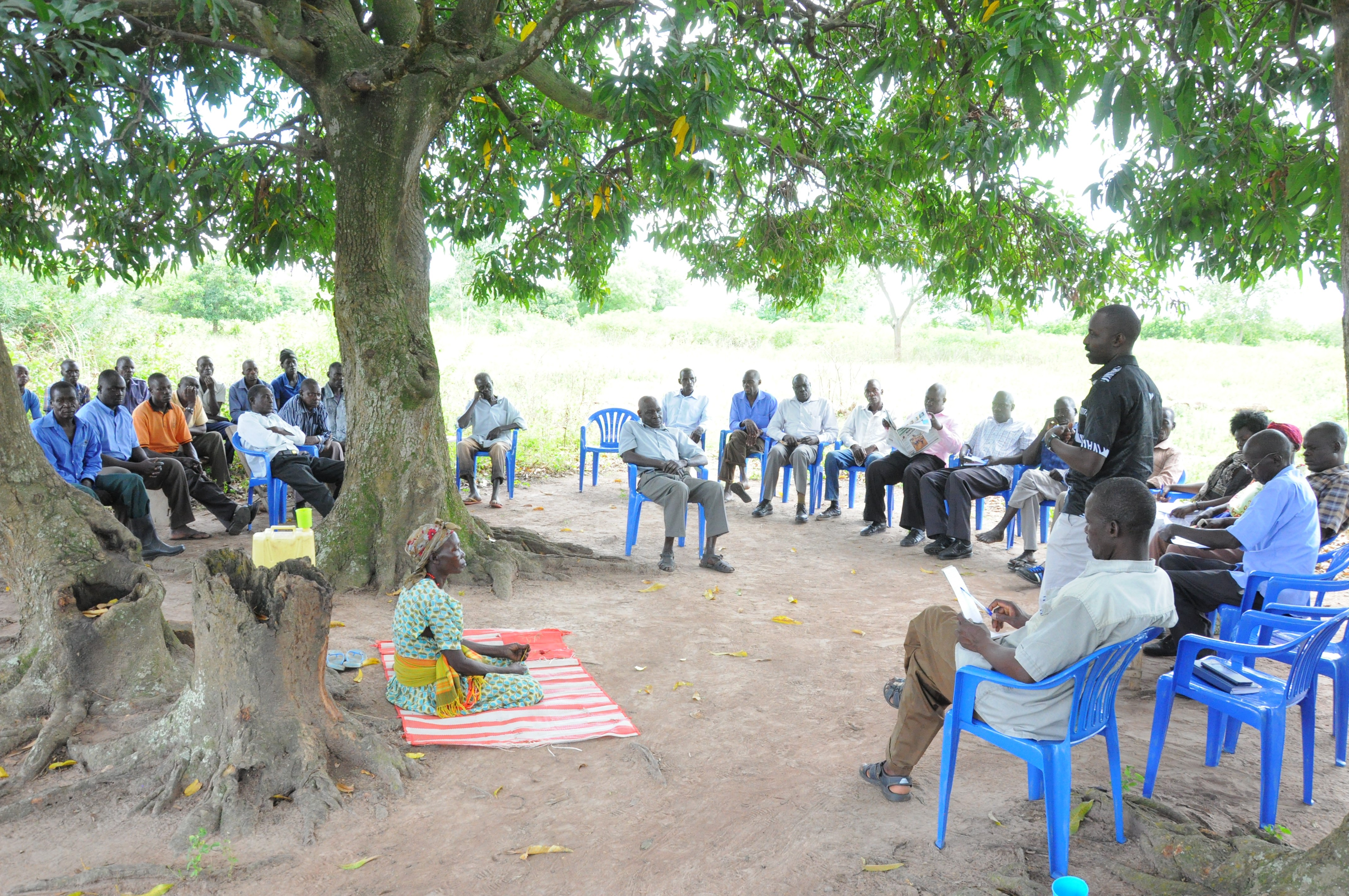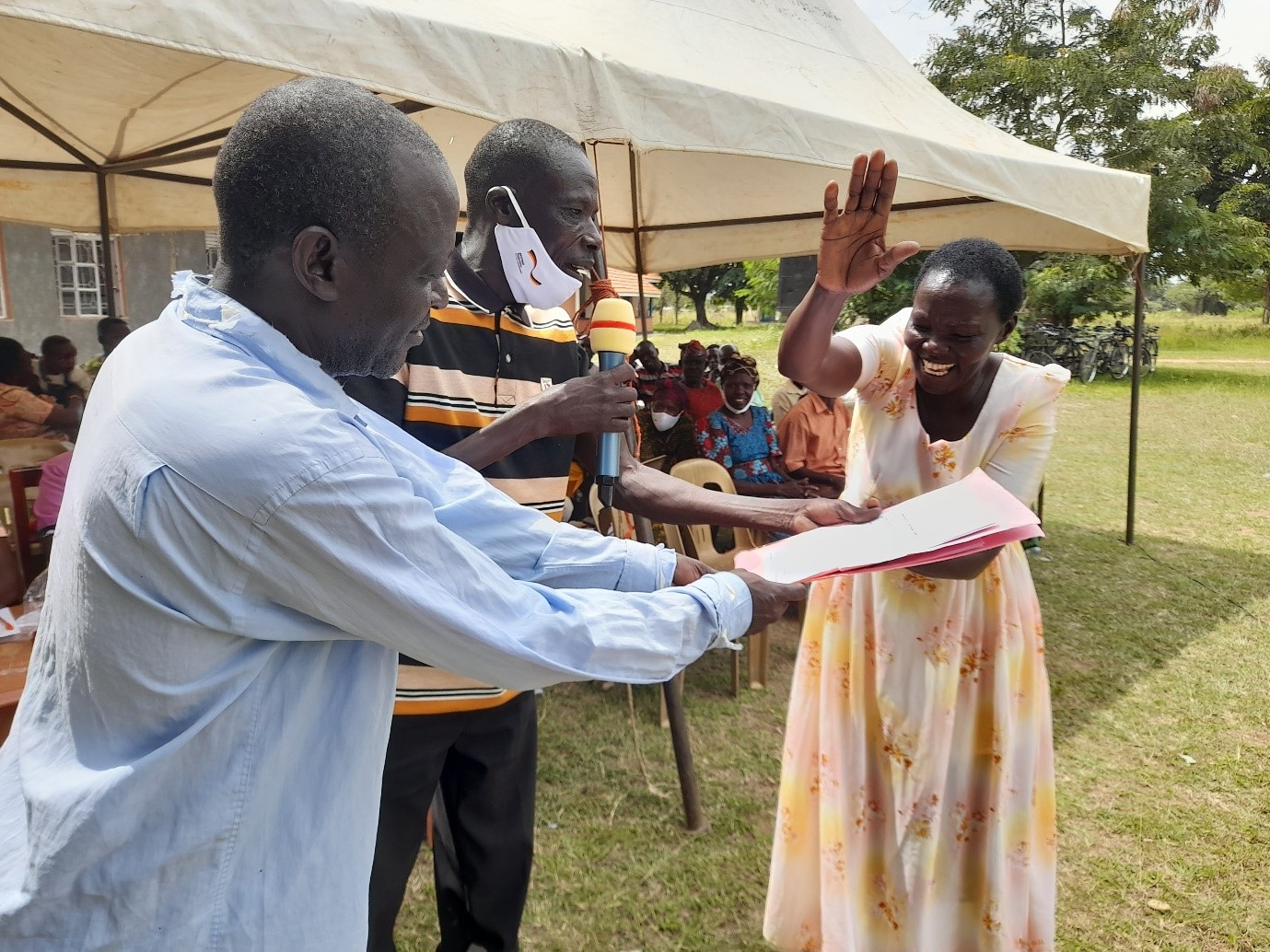An Inclusive Peacebuilding Approach in the Teso Sub-region of Uganda
By Florence Amoding with Karin Felzmann
Summary: Imagine sitting under a huge mango tree, protected and sheltered from the harsh African sun, a soft and sandy wind bellowing the natural music of its branches. And then, a massive sound bursts with local dancefloor music, beckoning people out of their huts. There is laughter and ululation mixed with an aura of joy, but equally tears bundled up in the theater performance. The audience watches in awe as the actors relay typical scenarios of conflicts on land use, ownership, and access—all precursors to violence in the Teso, a region in eastern Uganda.
Despite the tensed up uncertainties, this applied theater eases communication and animates the construction of non-violent and win-win responses to the prevailing disputes. As Augusto Boal explained in his highly acclaimed Theater of the Oppressed (1979), the social potential of theater can be found in its experiential, educative, and entertaining nature, an approach that is currently being used to help people in Teso render inclusive identities and participation in restoring broken relationships (1). This practice, implemented by the Teso Initiative for Peace, is what our article focuses upon.
Finding a Creative Approach to Peace
The Teso sub-region is found in northeastern Uganda, East Africa. The people of this region have experienced land violence following the return of internally displaced persons (IDPs) to their ancestral land. The displacement resulted from a two-decade armed insurgency and cattle rustling, which is still a prevalent practice of tribesmen stealing their neighbors’ cows. The indigenous communities own land using customary practices with no boundary marks or beacons. Where someone’s land begins and ends is merely claimed by shared understanding and is thus often a matter of argument.
Studies conducted in search of lasting solutions point out that community structures should guarantee peoples’ rights of ownership, access, and use of their land—and equally resolve land disputes. But the absence of avenues to discuss pertinent issues and the increasing pressure on the land is threatening the region’s security (2). Local leaders are not adequately responding to these evolving complexities, making people more suspicious and distrustful, and subsequently preventing meaningful conversation and engagement.
These circumstances call for concerted community organizing, capacity building for effective land management, and the development of conflict-sensitive resolution approaches. Seeing the necessity of a creative and culturally-relevant solution, the Teso Initiative for Peace chose to implement a community theater approach, which is a method that enables communities to communicate their situation through role play without direct attribution and judgment, in order to discuss resolutions peacefully.
Engaging Culture to Enhance Ownership
The Teso Initiative for Peace (TIP) is a 20-year-old non-governmental organization that has participated in developing community theater as a proactive approach to land rights awareness. To implement this conflict resolution method, TIP recruited talented and enthusiastic people from villages across the region. They were organized and trained to champion the use of community theater as a way to animate community involvement in developing local solutions that could address land violence. This approach uses opportunities inherent in the culture of the target groups and structures to enhance ownership, such as the love for storytelling, songs, idioms, and social gatherings.
These culture practices are often conveyed during fireplace, naming, marriage, and burial ceremonies, where elders relay stories, idioms and poetry meant to dialectically build acceptable character among its members. Men gather to take a local drink, while women sing and swing to cultural tunes. Children play educational games and sports, all with meaning behind them. Women ease up patriarchal trivialities as they walk to fetch water and firewood.
Therefore, the social narratives of the Iteso people—where poetry, music, and dance is part and parcel of daily discourse—make TIP’s take on community theatre especially relevant. The integration of this approach into local cultural traditions helps to develop a community spirit in articulating community needs, while upholding the principles of ‘tackling the issue’ rather than targeting the ‘individual’ (3).
Community theatre especially melts cold heartedness and encourages people to accept situations without being judgmental. It enables people to be at ease and respected, and encourages them to enjoy the moment without amassing negative memories and emotions. Community theatre helps develop trust, safety, and social cohesion. This strengthens social and cultural capacities to resolve conflicts, and promotes meaningful interaction and dialogue (4). The Iteso use theatre when faced with challenges emanating from poor leadership or disasters, and when celebrating events of life.
Community theatre also provides information that touches people’s needs and interests. It offers exposure and talent rediscovery, while challenging power dynamics between men, women, and youth—boys and girls—as well as duty bearers and rights holders. It particularly espouses participation, dialogue, consensus, commitment, teamwork, and creativity. Most importantly, community theatre moves people from the known to the unknown in addressing community problems. This approach moves people into identifying their needs, and stimulates desire and activism for change. And, of course, it equally entertains.
Local Impacts

TIP previously used cinema education as its core peacebuilding method. However, since using films can be expensive, it instead adopted a community theatre approach. As we work to mobilize a community through theatre, participants are encouraged to identify and articulate pertinent issues requiring redress. Community members are subsequently invited to listen, reflect, discuss, and agree on the requisite action points. We regularly observed that this approach results in open discussions, which creates understanding among the audience.
Through TIP’s work, we have found that our community theatre performances can cause positive ideological reorientation. For example, the communities of the Omodoi and Toroma Sub counties in Katakwi district grew to understand and appreciate the rights of marginalized and vulnerable people. This led to the addition of their names in the Certificate of Customary Ownership (CCOs). This practice had initially not been done because women, youth, and people with disabilities were not allowed to own property, including land, as they were excluded from land conflict resolution arenas. The names of these people are now included in the communities where the project was implemented, offering them further protection against land disputes in the future.
Conclusion
Community theatre has the power of cultural leverage in peacebuilding. It is educative, informative. and entertaining. It inspires people to take action, and promotes creativity and self-knowledge. Therefore, projects that seek to enhance inclusive participation should promote access to information using socially acceptable narratives that secure peoples’ identity, belonging, and sense of security.
Our model for community theater at the Teso Initiative for Peace can be replicated by working through the local structures and cultures in other communities, so that these approaches to peace are self-motivated and spring from ‘within,’ and progress becomes relevant and voluntary.
We thank the management and staff of TIP for using community theatre to animate community participation and for developing meaningful ways of resolving local land conflicts.
About the Authors
Florence Amoding has worked in peacebuilding for more than a decade. She is a versed trainer and skilled mediator in the Teso subregion of Eastern Uganda.
Florence is a patriotic and passionate Uganda woman, and a graduate in Democracy and Development Studies from Uganda Martyrs University. She advocates for better service delivery, especially in health, water, education, and land. Also, she has championed gender awareness, leading to joint efforts of men and women to promote equality and inclusion. In line with land governance engagement, Florence has worked to improve the lives of mostly marginalized peoples, whose land rights have been abused, through raising awareness and conflict resolution.
Karin Felzmann has worked in intercultural project management across China, Germany, and Uganda. On the side, she collected some creative diversions, such as producing documentaries in Uganda and Algeria, editing radio news in Indonesia, and mustering cattle in Australia. She is also a passionate German teacher, and she was able to live out in Kunming, China, with the lectureship program of the Robert Bosch Stiftung between 2017 to 2019. Currently, she is advising TIP as part of the German Civil Peace Service by AGIAMONDO, a program to support local interventions to foster peace and prosperity, as well as intercultural understanding.
References
1. Augusto Boal, Theater of the Oppressed (London: Pluto Press, 1979).
2. TIP & GIZ-Relapu, Comprehensive Coherent Land Conflict Management Mechanisms in Teso Sub-Region (Soroti, 2017), https://www.landportal.org/library/resources/field-reseach-and-desk-study-report.
3. Chris Moore, The Mediation Process: Practical Strategies for Resolving Conflict (San Francisco: Jossey-Bass Publishers, 2003).
4. GIZ-ZFD, Shimgelina, “Merging Ethiopian Wise Counsel Mediation and Facilitative Mediation” (Adis Abeba, 2013): 51f, https://www.ziviler-friedensdienst.org/sites/default/files/media/file/2022/zfd-merging-ethiopian-wise-counsel-mediation-and-facilitative-mediation-1949_77.pdf.

